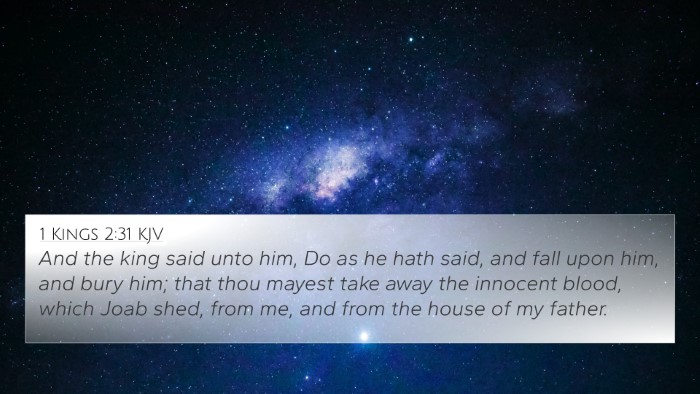Understanding 1 Kings 2:34
1 Kings 2:34 states, "And Benaiah the son of Jehoiada went up, and fell upon him, that he died. And the kingdom was established in the hand of Solomon." This verse records a pivotal moment in the transition of power from David to Solomon, highlighting themes of judgment, authority, and the establishment of God's chosen leader.
Contextual Analysis
This scene occurs in the context of King David's final instructions to his son Solomon, urging him to act wisely in securing the kingdom.
- Authority and Judgment: Benaiah's role illustrates the execution of divine justice over Adonijah, who attempted to seize the throne in opposition to Solomon.
- Establishment of Solomon's Reign: This act confirms Solomon's rightful place as king, setting the stage for his reign and the building of the Temple.
- Consequences of Rebellion: Adonijah's death serves as a warning against rebellion and an affirmation of God's sovereignty.
Commentary Insights
According to prominent public domain commentaries:
- Matthew Henry: Henry emphasizes the necessity of maintaining order and justice within the kingdom. He interprets Benaiah's actions not only as a personal vendetta but as fulfillment of God’s will to secure Solomon’s reign.
- Albert Barnes: Barnes highlights the political implications of this event, noting that such actions were common in ancient Near Eastern politics where disloyalty often resulted in death. Barnes views this as essential for Solomon’s consolidation of power.
- Adam Clarke: Clarke points out that this incident reflects the larger theme of divine providence, where God orchestrates events in accordance with His plans for Israel through Solomon.
Bible Verse Cross-References
1 Kings 2:34 can be cross-referenced with the following Bible verses, which connect and clarify the themes present in this passage:
- 1 Kings 1:5-7: This passage details Adonijah's attempt at usurping the throne, providing context to the conflict leading to verse 34.
- 1 Kings 2:25: This depicts Benaiah's execution of those who defy the new king, further illustrating the theme of divine justice in the establishment of Solomon's reign.
- 2 Samuel 12:10-12: God's judgment upon David's house, emphasizing that the consequences of sin permeate through generations, particularly concerning power struggles.
- Proverbs 16:10: "Divine sentence is in the lips of the king: his mouth transgresseth not in judgment," illustrating the biblical understanding of kingship and divine authority.
- 1 Chronicles 28:5: Solomon's divine selection as king reinforces the legitimacy of his reign and the importance of obedience to God's will.
- Romans 13:1: "Let every soul be subject unto the higher powers," relates to the scriptural theme of recognizing God’s authority over earthly kingdoms.
- Revelation 19:11: The portrayal of Christ as the ultimate judge complements the idea of divine authority depicted in Solomon's establishment as king.
Thematic Bible Verse Connections
The verse establishes connections within the narrative of the kings, themes of justice, authority, and the consequences of rebellion against God’s ordained leadership pervade Scripture, echoing throughout other texts in the Bible:
- Judgment and Authority: The pattern of rebellion leading to judgment appears throughout the Scriptures, seen also in stories like the rebellion of Korah (Numbers 16) and the fate of King Saul (1 Samuel 15).
- The Role of Kingship: The principles of leadership and divine authority are examined in the Psalms, particularly Psalms 2 and 72, which reflect the ideal characteristics of Godly kings.
- Foreshadowing Christ: Solomon's reign is often seen as a foreshadowing of Christ’s ultimate kingdom, with verses like Isaiah 9:6-7 presenting the ideal ruler characterized by justice and righteousness.
Conclusion
In summary, 1 Kings 2:34 serves as a vital link in understanding the transition of power in Israel, emphasizing the themes of divine justice and authority. Through careful cross-referencing and thematic exploration, one can see how this crucial event shapes not only the future of the kingdom but aligns with broader biblical principles of kingship and divine sovereignty.









